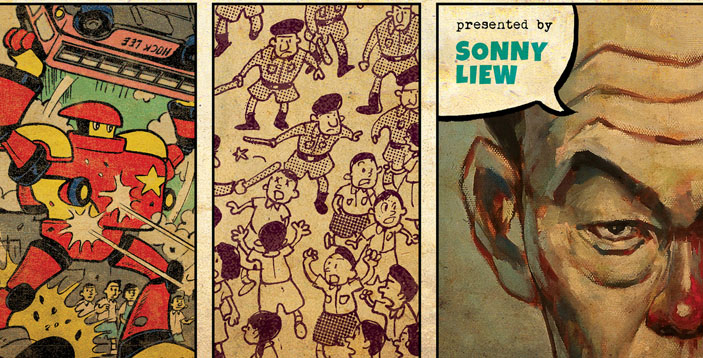WE HAVE what it takes for Singaporeans to make it on the global stage on their own steam.
Joseph Schooling did it, winning gold at the Olympics.
And now Sonny Liew has done it, bagging three Eisner Awards over the weekend for his graphic novel, The Art Of Charlie Chan Hock Chye.
One thing to note is both were achieved on their own dime. Schooling’s parents magnanimously funded his effort as the nation cheered, shamelessly.
The National Arts Council (NAC) may try and squeeze some credit for initially acknowledging Liew’s talent. It had, after all, offered an $8,000 grant for Liew’s winning experimental graphic novel, which weaves fiction into fact about Singapore’s history.
The grant was withdrawn at the last minute when NAC balked at the contents which sent a shiver up and down the spine of the establishment, leaving publisher Epigram in the lurch.
But it looks like Liew and Epigram are having the last laugh now.
The graphic novel picked up the Best Writer/Artist award for Liew, as well as Best US Edition of International Material—Asia and Best Publication Design. Liew, who has done work for Marvel and DC Comics, was nominated for six awards this year.
Role Of Government In Culture
While The Art Of Charlie Chan Hock Chye won big for Liew and his adoptive nation, will Singapore be big enough to accept this?
With the Internet opening the world to Singapore, and vice versa, it’s time for the local institutions to forego provincial thinking when it comes to deciding what audiences want to see and appreciate.
The government should not play the role of art critic.
But since it is using public funds to administer the nation’s arts programmes, it should be more forthcoming about who chooses these programmes, and how they are chosen, with the interests of the general public in mind.
This may encourage debate and offer perspectives that would widen the public’s appreciation and understanding of how culture is able to serve as a guide to moulding the future of Singapore.
It’s only by reflection and critique (not complaining and withholding) that we can grow and learn to step up meaningfully in the world.
If we claim to be a first world nation, then we should start to think, behave and act like one.





















Is this a trend? When the government’s fingers are not in the pie, Singapore talent tends to shine.
The US has cut funding for arts. People think it’s Trump, but it’s John McCain who has been leading the charge for this for more than 10 years. Trump just signed an executive order to shortcut what the Republicans have been clamoring for.
The Republicans say that as long as bridges are falling, inner cities crumbling and other issues like poverty are not properly mitigated etc, the US government has no business funding artists. So things like the National Endowment of the Arts Awards etc will go. Luckily they have enough private organizations that will keep a lot of it going.
In Singapore, without government support, I can tell you that a lots of arts companies will collapse. Few, if any, especially a number of theatre groups will be able to survive.
Corporate sponsorship has dwindled and sponsorship is getting less and less. The super and uber rich prefer to buy mega yachts than sponsor things and companies have less and less disposable income for sponsorship.
In the case of Sonny Liew, I believe that he should be hailed and congratulated by the people and government of Singapore. I personally congratulate him on his well deserved success.
But I really cannot see why the government should have continued funding him since he was critical of them.
He had every right to criticize and be uncensored. But the government had every right to withdraw his funding.
No government in the world is required to fund people who seek to damage it.
Therein lies the intrigue.
Should the government stop funding arts and allow unbridled criticism and remove censorship? Or fund the arts but titrate the amount of criticism a government will accept before agreeing to fund.
Like many other things in Singapore it’s a balance and a part of horse trading in politics that every country has to face.
Because if the government reduces arts funding to the minimum that a government should fund instead of their very generous arts funding policies, I really do believe that the arts will not survive in Singapore.
My personal funding I have applied for is minimal. I hardly applied for a support before I received the Cultural Medallion. And since then, very little for myself personally.
Now that I have an Arts charity in the Jazz Association (Singapore) Limited, I ask more often, but only because it’s for the wider jazz community.